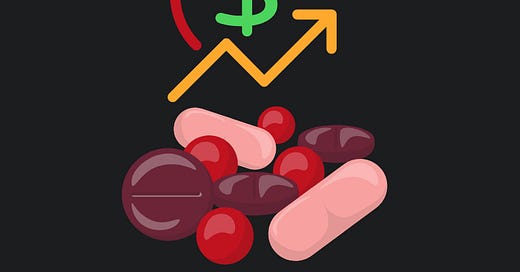Misunderstanding the Utilitarian Argument for High Drug Prices
if low pharmaceutical profits reduce r&d that doesn't mean that drugs should be sold at their market price or that individuals should pay high out-of-pocket costs
There’s a utilitarian argument against imposing price controls on prescription drugs that’s popular among libertarians, LessWrong-adjacent rationalists and some economists. The argument goes something like this: we tend to think of high drug prices and big profits for pharmaceutical companies as a bad thing, but using price controls to lower drug prices below their market rate and reduce profitability would mean that pharmaceutical companies invest less in research in development, which would slow down the development of life-changing drugs and leave us worse off on aggregate. The theory behind the claim that drug price controls lead to a reduction in R&D investment and life-changing drug innovation seems straightforward. There’s some economic literature supporting the argument too (though I don’t follow this closely), so it seems to be getting more popular these days.
For some reason, perhaps because this argument is usually made by Americans of a libertarian bent, proponents tend to present it as an argument for the view that governments should let pharmaceutical companies charge the market rate and poor Americans should tolerate high prices. For example, in a book published by the American Enterprise Institute Press, John A. Vernon and Joseph H. Golec make this comment before explaining how they’re going to make the utilitarian argument:
Pharmaceutical price controls constitute a short-sighted, wrong-headed, and possibly dangerous policy. The prices set by the free market are the signals that corporations need in order to decide whether to undertake expensive, risky research into new drugs. Free-market pricing is essentially a voting mechanism, whereby consumers can send signals to producers about what they value.
Scott Alexander skirts around the issue a bit by saying that more innovation could lead to lower prices in the long run and doctors could do their patients a favour by not unnecessarily prescribing expensive brand-name drugs before conceding that “rich people can buy Harvoni now for $30,000, and poor people will have to wait ten years to buy Harvoni when it costs $100”.
But the utilitarian argument does not entail any of this. The argument says nothing about the importance of price signals, having a free market for pharmaceuticals or high out-of-pocket costs for individuals. Rather, the argument entails that pharmaceutical companies should receive as much remuneration as needed to increase research and development investment to a welfare-maximising level. It is unlikely that this amount of financial remuneration would, in all cases, correspond exactly with the market prices of prescription drugs. Nor does this renumeration need to come from individual consumers.
In fact, in countries with widespread private health insurance, the market price is already negotiated down by insurance companies. Americans generally pay more for prescription drugs because of high co-payment rates and coverage being determined by the employer-sponsored plan they get and/or their ability to pay. If the government had a universal drug insurance scheme, then they could pay the ‘market price’ (or more!) while the individual receiving the medication would pay nothing out-of-pocket.1
I would go as far to say that the utilitarian argument for high drug prices would favour this sort of arrangement over one where individuals are faced with high out-of-pocket costs when receiving prescription drugs. The state has a much greater ability to pay these costs via tax revenue than unwell individuals, so we can ensure that everyone gets the medication they need and drug companies make even more money. Market pricing as a ‘voting mechanism’ for drug research makes little sense when the consumers are a bunch of different insurance companies and private individuals, but it makes a bit more sense if the consumer is a government informed by experts on public health and cost-effective drug research. It also has the added advantage of distributing the cost burden in a more egalitarian way, unlike a system where individuals need to pay for their own prescription drugs in part or full.
There are other ways, perhaps more sensible ways, of having the government renumerate drug companies to promote R&D investment like giving cash prizes as an alternative to patents or funding drug research directly etc. These wouldn’t involve high prices per se but would generously remunerate pharmaceutical companies for developing new and better drugs. Either way, the utilitarian argument for high drug prices does not work as an argument for market prices and high out-of-pocket costs for individual consumers.
Or at least very little, if you really think there needs to be some co-payment.



